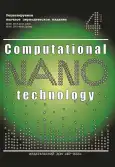Algorithm for detection of head tremor according to data of a smartphone video camera of a biomedical monitoring system
- Authors: Egorchev A.A.1, Chikrin D.E.1, Pashin D.M.1, Fakhrutdinov A.F.1
-
Affiliations:
- Kazan (Volga Region) Federal University
- Issue: Vol 11, No 4 (2024)
- Pages: 87-93
- Section: MATHEMATICAL AND SOFTWARE OF COMPUTЕRS, COMPLEXES AND COMPUTER NETWORKS
- URL: https://journal-vniispk.ru/2313-223X/article/view/282564
- DOI: https://doi.org/10.33693/2313-223X-2024-11-4-87-93
- EDN: https://elibrary.ru/GGHQUC
- ID: 282564
Cite item
Abstract
Modern conditions demand active digitization from humanity across various spheres of activity and daily life, facilitating faster task completion and simplifying processes. Self-diagnosis allows individuals to identify symptoms, which can serve as a basis for consulting medical professionals, especially crucial in critical situations where lives are at stake. Thus, it is clear that the development of such systems is a relevant challenge. In this context, head tremor plays a significant role as it may indicate the presence of Parkinson’s disease or multiple sclerosis. The aim of this work is to develop a head tremor detection module suitable for integration into smartphone applications. The study employs a method based on analyzing data from the optical sensor, namely the front camera of the smartphone. This method utilizes an open machine learning model, ML Kit, for facial recognition, along with a specially designed algorithm for processing results. Testing demonstrated an accuracy of 0.92 according to the accuracy metric. This approach offers a novel method for detecting head tremors and highlights the effectiveness of using ML Kit’s standard model for similar tasks on smartphones, which can also be applied within a larger biomedical diagnostic system.
Full Text
##article.viewOnOriginalSite##About the authors
Anton A. Egorchev
Kazan (Volga Region) Federal University
Author for correspondence.
Email: anton@egorchev.ru
Cand. Sci. (Eng.); Director, Institute of Computational Mathematics and IT
Russian Federation, Kazan, Republic of TatarstanDmitry E. Chikrin
Kazan (Volga Region) Federal University
Email: dmitry.kfu@ya.ru
ORCID iD: 0000-0003-1358-8184
Dr. Sci. (Eng.); Director, Institute of Artificial Intelligence, Robotics and System Engineering
Russian Federation, Kazan, Republic of TatarstanDmitry M. Pashin
Kazan (Volga Region) Federal University
Email: dmitry.m.pashin@gmail.com
Dr. Sci. (Eng.); Vice-Rector for Digital Transformation and Innovation
Russian Federation, Kazan, Republic of TatarstanAdel F. Fakhrutdinov
Kazan (Volga Region) Federal University
Email: timvaz@yandex.ru
ORCID iD: 0009-0002-7520-9223
graduate student, Institute of Physics
Russian Federation, Kazan, Republic of TatarstanReferences
- Fedorovich A.A., Gorshkov A.Y., Korolev A.I., Drapkina O.M. Smartphone in medicine – from a reference book to a diagnostic system. Review of the current state of the issue. Cardiovascular Therapy and Prevention. 2022. No. 9. Pp. 66–74. (In Rus.)
- Vu J.P., Cisneros E., Lee H.Y. et al. Head tremor in cervical dystonia: Quantifying severity with computer vision. Journal of the Neurological Sciences. 2022. No. 434. Pp. 120–154. doi: 10.1016/j.jns.2022.120154.
- Elble R., Hellriegel H., Raethjen J., Deuschl G. Assessment of head tremor with accelerometers versus gyroscopic transducers. Movement Disorders Clinical Practice. 2016. No. 4. Pp. 205–211.
- Liu W., Lin X., Chen X., Wang Q. Vision-based estimation of MDS-UPDRS scores for quantifying Parkinson’s disease tremor severity. Medical Image Analysis. 2023. No. 85. Pp. 637–647.
- Elble R., Ondo W. Tremor rating scales and laboratory tools for assessing tremor. Tremor and Other Hyperkinetic Movements. 2022. No. 435. Pp. 1–10.
- Elble R., McNames J. Using portable transducers to measure tremor severity. Tremor and Other Hyperkinetic Movements. 2016. No. 6. Pp. 1–12.
- Frolov S.V., Gorbunov A.V., Potlov A.Y. Recording and analyzing tremors using a webcam-based motion detector. Biomedicine. 2012. No. 2. Pp. 80–83. (In Rus.)
- Govorova T.G., Tappahov A.A., Popova T.E., Antipina U.D. Tremor: Classification, clinical characteristics. Consilium Medicum. 2018. No. 9. Pp. 95–100. (In Rus.)
Supplementary files












